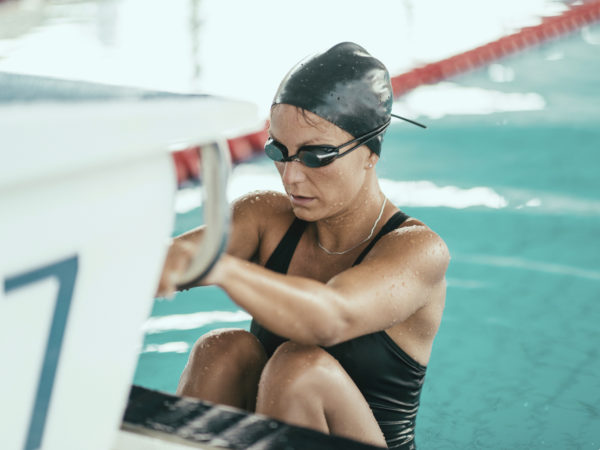Swimming is the Lifetime Exercise

For most people, swimming is less convenient than walking or running because it requires a pool and some skill. Exercise in water offers several advantages that other forms cannot. Water neutralizes the force of gravity, allowing free movement of joints and muscles. This makes swimming the activity of choice for anyone with musculoskeletal problems, such as arthritis or traumatic injury. Many people get into a desirable altered state of consciousness while swimming, brought about by the feelings of freedom and buoyancy water provides and by rhythmic breathing. Unlike walking and running, swimming uses the upper body as well as the lower, giving a more balanced muscular workout. It does not provide as intense a cardiovascular workout as running does.
To use swimming well as aerobic conditioning, you should develop good form, meaning good posture in the water, an efficient stroke, and breathing synchronized with movement. It may help you to work with a trainer for a while to improve your form if you intend to use this as a major exercise. The freestyle or crawl is the best stroke for aerobic swimming. Water aerobics, a combination of swimming, dance movements, and calisthenics, is taught in classes at many health clubs and can be much more interesting than swimming laps.
The disadvantages of swimming have to do mostly with pools. Unless you are lucky enough to live near a swimmable body of water in a favorable climate, a lot of your swimming will be done in pools. These environments are often not inspiring, and chlorinated water can be very bad for your eyes, skin, and hair, as well as for the membranes of your nose, mouth, and upper respiratory passages. Definitely wear good-fitting goggles or even a mask and snorkel, which can also help you achieve better posture in the water. I do not recommend ear plugs. If you get water in your ears, put a little of a 50/50 mixture of rubbing alcohol and white vinegar in them when you dry off; it will remove the water. If you swim a lot, you will want to find a heated pool. This is especially important for people who have arthritis or injuries, because cold water can make those conditions worse. Another caution: Try to get in the habit of turning your head both to the right and to the left to breathe, or swim with a mask and snorkel so that you do not have to turn your head at all. If you always turn to one side, you may develop neck and shoulder problems from unequal strain on muscles.
Find more healthy living information in the Exercise and Fitness section.










